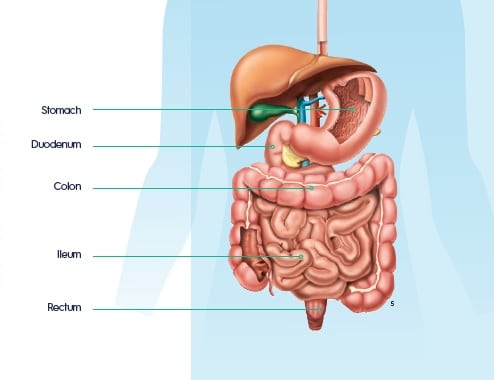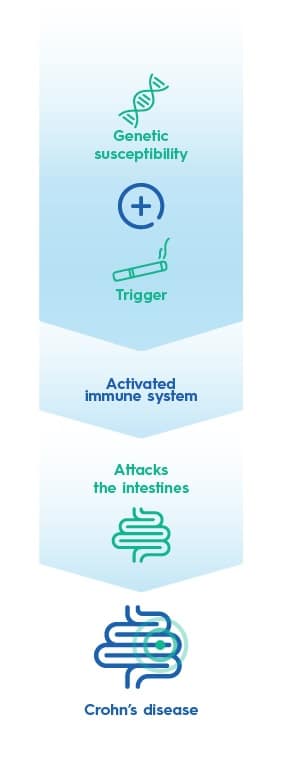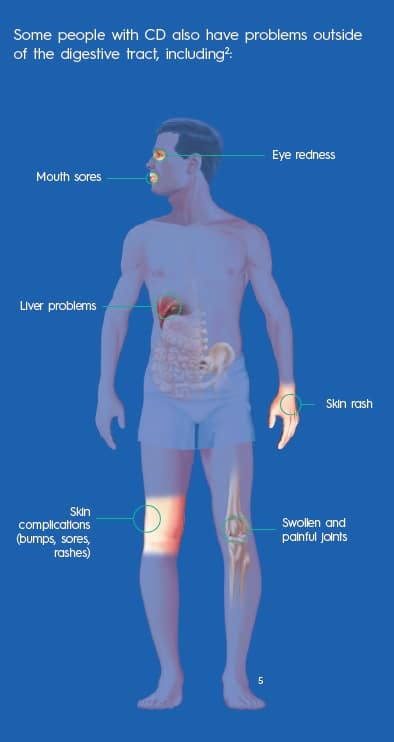Crohn’s Disease

What is Crohn's disease?
Crohn’s disease (CD) is a chronic inflammatory condition that affects the digestive tract. It usually affects the last part of the small intestine (ileum) and the beginning of the colon but it can affect the entire digestive tract, from the mouth to the anus1,2.
The disease can occur at any age, but it is most often diagnosed in adolescents and adults between the ages of 20 and 302.

What causes Crohn's disease?
The cause of Crohn’s disease (CD) is unknown1.
- Genetics
Having family members with this condition increases the risk of developing CD1,2. - Risk factors
When a person with this inherited risk is exposed to a trigger (something in
the environment), the immune system is activated1. - The immune system recognises the lining of the digestive tract as foreign and attacks it, causing inflammation, which eventually leads to ulcers and symptoms of CD1,2.

What are the symptoms of Crohn's disease?
The most common symptoms of CD include1,2:
- Diarrhoea
- Abdominal pain
- Weight loss
- Fever
- Rectal bleeding
- Fatigue
Crohn’s disease typically follows cycles of flares (when the condition worsens and
symptoms are present) followed by periods of remission (when inflammation is controlled, and symptoms are absent)2.

How will my doctor diagnose my disease?
A combination of tests are used to diagnose CD1,2,3:
- Blood tests
To check for anaemia. - Stool studies
To test for routine pathogens. - Colonoscopy
Allows to view the entire colon. During this procedure, small samples of tissue can be taken (biopsy) for laboratory analysis, which may help to make a diagnosis. - Computerised tomography
Allows to detect fistula and CD-related stenosis - Magnetic resonance imaging
Useful for evaluating a fistula around the anal area - Capsule endoscopy
A swallowed capsule with a camera takes pictures of the small intestine.
What are the treatment options?
Which medicine is used depends on several factors such as age, the part of the intestine affected, severity and the presence of other medical conditions3:
- 5-aminosalicylates and sulfasalazine:
Used to reduce inflammation in the last part of the ileum and colon3 - Immunomodulators:
Might be recommended if you have severe symptoms or do not improve with
steroids, or if your symptoms worsen after decreasing your steroid dose3
Treatment is directed both toward improvement of symptoms and controlling the disease process3.
In addition to controlling and suppressing symptoms, medication can also be used to decrease the frequency of symptom flare ups2.
- Corticosteroids:
Used for a limited time to reduce inflammation1 - Biologics:
Used to induce remission. These are often used in combination with treatments described above2,3
If medicine does not control symptoms, surgery might be an option2
Surgery and Crohn’s disease
Even with proper medication and diet, as many of two-thirds or three-quarters of people with CD will require surgery at some point in their life2.
Surgery for CD commonly include removal of part of the colon: the surgeon removes the diseased part of the intestine (resection), then rejoins the two healthy ends (anastomosis)2.
While these procedures may cause the disappearance of symptoms for many years, CD frequently recurs later in life2.
What can I do to manage my disease?
Some lifestyle recommendations to avoid worsening of the disease are3,4:
- Temporarily avoid foods that might worsen your symptons, such as diary products
- Eat small meals and drink plenty of liquids
- Practice regular relaxation to cope with stress
- Quit smoking
- Avoid nonsteroidal antiinflammatory drugs (NSAIDs) such as ibuprofen and naproxen


Related Brochures

ulcerative-colitis

juvenile-idiopathic-arthritis
